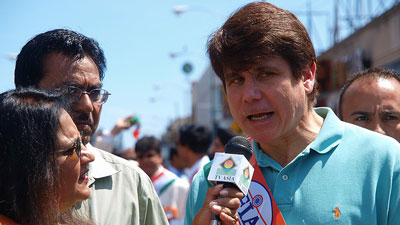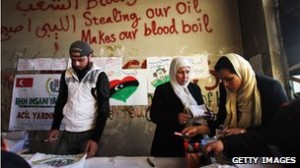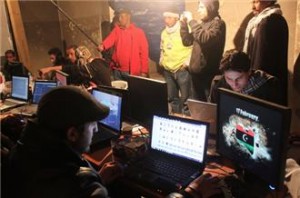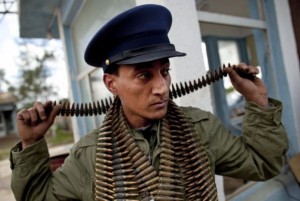 The big news today is Rod Blagojevich got his ass handed to him in court yesterday. A jury found him guilty of 17 corruption charges. “I, frankly, am stunned,” said Blagojevich as he left the court house. There is a number of other things happening also including plenty of war crimes.
The big news today is Rod Blagojevich got his ass handed to him in court yesterday. A jury found him guilty of 17 corruption charges. “I, frankly, am stunned,” said Blagojevich as he left the court house. There is a number of other things happening also including plenty of war crimes.
Gaddafi
UN Security Council vote news. Continue reading
By Lady_E
Two weeks in to the Libyan uprising events continue to unfold at breathtaking speed as opposition and Gaddafi forces engage in heated battles for control of the country. The initial opposition momentum that resulted in close to half of the country falling to opposition hands and threatening Gaddafi’s control of Tripoli has shown signs of receding as Gaddafi has successfully reinforced his control of Tripoli and now begun counter-attacks to reclaim opposition-held territories. Though opposition forces have claimed success in repulsing Gaddafi’s most recent counter-offensive, opposition forces are now debating requesting foreign intervention under a UN banner, specifically targeted air strikes against weapons compounds and military installations such as radar stations. Foreign military intervention of this type would be a major escalation of international involvement (to date limited to non-military measures by the UN Security Council, the European Union and the United States) and appears to have little support from Security Council and NATO nation state members.
Gaddafi’s brutal crackdown and the developing humanitarian crisis has led many to ask what, if anything, the international community could do. Are there other options available? The most often mentioned proposal is the imposition of a No Fly Zone (NFZ) over Libya. This article is not advocating for or against an NFZ. An NFZ may sound like a relatively simple solution and most people are probably familiar with the general concept (as it has been used before and during the Gulf Wars and in the Balkan conflicts), but there are serious concerns about a Libyan NFZ, for both the potential enforcing foreign nations and for the opposition movement within Libya.
Many serious international commentators have weighed in on a No Fly Zone, for and against. Each view deserves careful consideration and the point of this article is to provide readers with links to the varying arguments to spur debate and present a more fleshed out backdrop of the competing concerns and interests. Before we begin, however, a quick note on the actual mechanics of how an NFZ would come into being. An NFZ would have to be authorized by the UN Security Council under its Chapter VII Charter Mandate and could be enforced either by UN member states or the NATO military alliance. An NFZ is a military intervention, not a non-military measure. From a practical standpoint, Russia (a veto-holding Security Council permanent member) is currently ruling out a UN Security Council NFZ and the NATO Alliance members are similarly split on the issue. For more on this aspect, see here.
Arguments For a No Fly Zone
Britain Prime Minister David Cameron, House of Commons Address: Prime Minister Cameron has proposed taking the lead on coordinating a military no fly zone, saying “[w]e must not tolerate this regime using military force against its own people. In that context I have asked the Ministry of Defence and the Chief of the Defence Staff to work with our allies on plans for a military no-fly zone.”
Michael Rubin, American Enterprise Institute, USA Today: Mr. Rubin argues that American credibility is on the line and that we cannot stand by in the face of civilian “slaughter.” He suggests that “Obama should take action: First, he should order U.S. fighter jets based in Sicily and on Mediterranean aircraft carriers to enforce a no-fly zone over northern Libya. Not only would this prevent Libyan planes from again strafing civilians, but it would also enable safer evacuation of non-Libyans. If Gadhafi’s henchmen continue their slaughter, Obama might impose no-drive zones for military vehicles.”
David Cortright, University of Notre Dame’s Kroc Institute for International Peace Studies, NY Times Room for Debate Forum: Mr. Cortright argues for a multi-lateral no fly zone authorized by the UN, but endorsed by the Arab League and one that includes Arab governments such as Egypt and Morocco. He argues “[m]ore than 200 Arab organizations and intellectuals have urged Arab League support for a no-flight zone. Gaining the league’s support in this new era of more responsive politics in the region should be possible and must be a priority. This will make it easier to convince China and other hesitant Security Council members to approve U.N. authorization and will hasten Colonel Qaddafi’s downfall.”
Marc Lynch, Foreign Policy Magazine: Mr. Lynch argues that it is time for concrete actions against Gaddafi’s regime. “It is time for the United States, NATO, the United Nations and the Arab League to act forcefully to try to prevent the already bloody situation from degenerating into something much worse. By acting, I mean a response sufficiently forceful and direct to deter or prevent the Libyan regime from using its military resources to butcher its opponents. I have already seen reports that NATO has sternly warned Libya against further violence against its people. Making that credible could mean the declaration and enforcement of a no-fly zone over Libya, presumably by NATO, to prevent the use of military aircraft against the protestors.”
Arguments Against a No Fly Zone
Marc Leon Goldberg, UN Dispatch: Mr. Goldberg responds to Marc Lynch and challenges the effectiveness of an NFZ:
“There has been a sort-of coalescing around the idea that a No Fly Zone is useful way to intervene to stop the killing. I am not so sure. While it is true that some of the slaughter has been perpetrated by Libyan air force, air assets alone are not responsible for the killing. If Qaddafi and his inner circle are intent on violently suppressing this revolt, they will use their superior ground forces as well. A No Fly Zone is a humanitarian half measure. It would let the international community say that it is doing something, but there is very little a No Fly Zone can actually do to stop ongoing slaughter.”
Defense Secretary Gates, Admiral Mullen, General Mathis, Pentagon News Conference: Gen. Mathis points out that an NFZ would first require disabling Libya’s air defense system, a significant military exercise. Sec. Gates stated “there would be multiple consequences to military action, including to United States forces already at war in the region. “If we move additional assets, what are the consequences of that for Afghanistan, for the Persian Gulf?” and that “we also have to think about, frankly, the use of the U.S. military in another country in the Middle East.”
Edward Rees, Senior adviser to Peace Dividend Trust, The Atlantic: Mr. Rees argues “enforcing a no-fly zone (NFZ) over Libya is unlikely to do as much good as its backers hope, and could in fact backfire.” Mr. Rees highlights the practical effectiveness of an NFZ because of the size of Libya, the lack of nearby air bases from which to impose the NFZ (meaning it may have to be enforced from aircraft carriers), the risk of downing the wrong aircrafts and being drawn into a ground conflict.
Kori Schake, Hoover Institution, NY Times Room for Debate Forum: Ms. Schake presents four reasons why the US should not use military force, including the fact that “we have not had an ambassador in Libya for months, and we have evacuated our diplomats; we ought not overestimate how much we understand what is occurring in the country or the shape Libya’s rebellion will take.”
To read more views, see the New York Times Room for Debate Forum: http://www.nytimes.com/roomfordebate/2011/03/01/should-the-us-move-against-qaddafi
By Lady_E with assistance from Kenneth Gibson
Despite his bizarre claims in an interview with ABCNews’ Christiane Amanpour, Gaddafi’s crackdown on opposition forces intensified over the weekend with Special Forces, regular Army forces and fighter jets striking opposition targets. Meanwhile, opposition forces announced the formation of the National Libyan Council and selected former justice minister Mustafa Mohamed Abdel Jalil is to lead the initiative. The Council will coordinate attempts to liberate Tripoli and other Libyan areas still under Gaddafi’s control. On Sunday, Sens. McCain and Lieberman called on the US government to recognize and arm the provisional opposition government. Over the weekend and through last night, opposition forces fought fierce battles against pro-Gaddafi forces to maintain their hold on ‘liberated’ areas, but neither side appears to have gained a clear military advantage. Opposition forces repelled sustained pro-Gaddafi assaults on the opposition-held towns of Zawiyah and Misrata, but attempts to reach Tripoli did not materialize and it remains under Gaddafi’s control.

Beyond the military assaults, Libyan civilians trapped by the fighting are facing food and medical supply shortages. Over the weekend, The International Committee of the Red Cross (ICRC) entered Eastern Libya, including opposition held Benghazi, and is now providing medical assistance. The ICRC reports 256 killed and 2,000 people wounded in Benghazi. On Monday, French Prime Minister, François Fillon, announced that France is also sending two planes carrying doctors, nurses, medications and medical equipment to Benghazi. The planes are scheduled to leave this morning. However, due to the security situation, aid is not reaching western parts of Libya. According to Valerie Amos, the UN humanitarian chief, the security situation around Tripoli remains too dangerous for international aid agencies to assess the need for medicine, food and other supplies in the west. The ICRC has also not been able to access Western Libya and Al Jazeera reports this morning that Gaddafi’s regime may be purposefully blocking food supplies to Western towns as a means of undermining opposition control.

For Libyans and foreign nationals who have been able to flee the country, refugee support remains limited. Sybella Wilkes, spokeswoman for the United Nations High Commissioner for Refugees, announced that more than 140,000 refugees have fled into neighboring countries, estimating that up to 75,000 refugees had already crossed into Tunisia from Libya and 69,000 others had crossed from eastern Libya into Egypt. Over the weekend, witnesses and news reports documented Tunisian guards repeatedly opening fire on refugees attempting to enter and refugees being beaten by guards. Once through the border, the refugee situation remains precarious. The Tunisian camp can accommodate about 10,000 people. “The resources are being drawn down as quickly as we can pump them in,” Ms. Wilkes said in a telephone interview. Relief workers have said they are concerned about sanitation in the camp and supplies of drinking water. In Geneva, Secretary of State Clinton announced the Obama Administration has set aside $10 million for emergency humanitarian relief through the U.S. Agency for International Development and that two teams of USAID experts are being sent to Libya’s borders to assess the refugee crisis and organize the delivery of aid.

More than two weeks after the uprising began the International community continues to increase pressure on the Gaddafi regime though military intervention but the imposition of a no fly zone remains unlikely at this point. Over the weekend, acting on President Obama’s Executive Order, the US Treasury Department froze $30 billion in Libyan government assets. The European Union imposed new sanctions, including an arms and police equipment sales embargo and a visa ban for Libyan officials. On Saturday the Security Council met for a second time and adopted Resolution 1970 under its Chapter VII, Article 41 authority which includes 1) an ICC referral, 2) an arms embargo, 3) an asset freeze and 4) a travel ban (Note: the Resolution link provides summaries of the Security Council member statements on the Resolution. Importantly, Ibrahim Dabbashi, the Deputy Permanent Delegate, represented the Libyan delegation).
Despite repeated pleas from the Libyan UN delegation, human rights groups and some US elected officials, the UN Security Council did not include imposing a no fly zone to prevent Gaddafi from bombing civilians by air. Today, Russian Foreign Minister Sergey Lavrov ruled out Russian support for a no fly zone. Russia is a permanent member of the UN Security Council and has veto authority. NATO could impose and enforce a no fly zone but has stated that any military interventions would have to be UN authorized.
For additional information and ongoing updates:
ICRC Resource Page: http://www.icrc.org/eng/resources/index.jsp
For up to the minute updates, links to on the ground reporting and a twitter live feed from the Region, visit the The New York Time’s Lede Blog (twitter feed on the right): http://thelede.blogs.nytimes.com/2011/03/01/latest-updates-on-libyas-revolt-and-mideast-protests-4/?hp
Al Jazeera English live stream: http://english.aljazeera.net/watch_now/
For those having problems with the Al Jazeera live stream (maybe it’s just me), sign up for LiveStation (it’s free!) and you can watch any Al Jazeera channel: http://www.livestation.com/
UN News Centre: http://www.un.org/news/
Images via BBC, Guardian, Al Jazeera and Newsday
Have a favorite news source we are missing? Put a link in the comments!